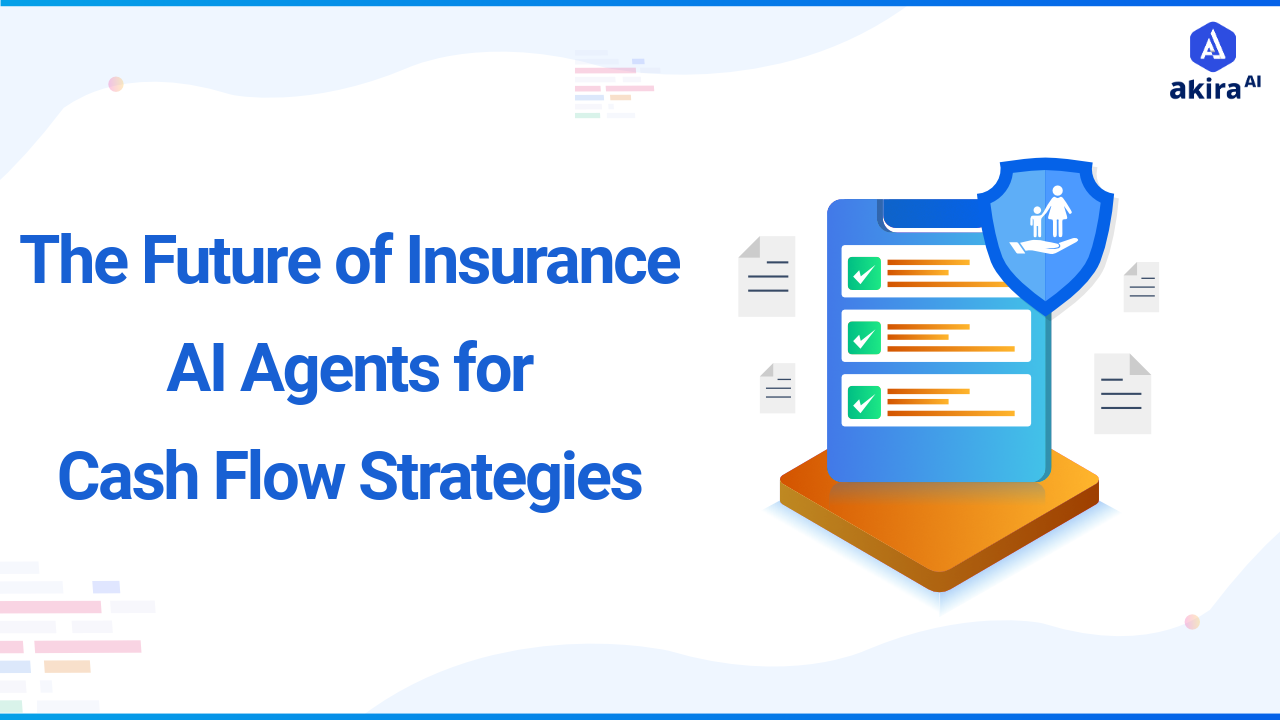Key Insights
-
Multi-agent systems enhance cash flow management by automating forecasting, real-time monitoring, and intelligent fund allocation.
-
Seamless integration across financial operations reduces delays, improves liquidity management, and ensures efficient premium collection and claims processing.
-
Predictive analytics and automation optimize investment strategies, prevent financial risks, and enhance overall operational efficiency.

Insurance companies have struggled with cash flow inefficiencies for years due to manual processes, delayed financial reporting, and disconnected departments. An Insurance firm that faced a severe liquidity crisis after an unexpected surge in claims following a natural disaster. Due to outdated forecasting models and siloed financial operations, the company had locked too much capital in long-term investments, leaving insufficient funds for immediate payouts.
To address such challenges, insurers are now turning to Multi-agent systems that provide real-time financial monitoring, predictive cash flow analysis, and intelligent fund allocation.
This blog explores how AI Agents are revolutionizing cash flow management in the insurance industry, creating a more resilient, efficient, and financially sustainable future.
What is Cash Flow Management?
Cash flow management refers to the process of tracking, analyzing, and optimizing the movement of money in and out of an insurance company. This ensures sufficient liquidity to cover claims, investments, and operational costs while maximizing profitability.
Cash flow in insurance include:
-
Premium Inflows: Premium Inflows function as the primary cash flow mechanism because insurance customers pay their premiums to the insurance company.
-
Claims Outflows: The company pays policyholders through Claims Outflows whenever they successfully file and clear a claim.
-
Operational Expenses: Business operations result in operational expenses that include salaries, marketing expenses and the necessities of IT infrastructure.
-
Investment Activities: Insurance operators invest funds to create profits that will sustain the company.
-
Regulatory Reserves: Regulatory reserves refer to financial regulations that require insurers to maintain minimum deposit funds to meet their financial responsibilities.
Insurance companies' unstable financial situation and decreased operational performance result from ineffective control of these key components.
Traditional Methods of Cash Flow Management in Insurance
Insurance companies have long managed financial operations through manual processes and disconnected departments, leading to inefficiencies. Premium collection, claims processing, and investment management operate in silos, delaying decision-making and misallocating resources. For instance, a claims department may process a large payout while the investment team unknowingly locks funds in long-term assets. The reliance on Excel spreadsheets and essential forecasting further complicates cash flow management, as these tools struggle with complex variables and slow adaptation to market changes.
Traditional systems also lack real-time visibility, with data consolidation and reporting taking days or weeks. This delay makes managers rely on outdated information, leading to suboptimal investment decisions and cost inefficiencies. Insurance companies risk liquidity shortages, missed investment opportunities, and operational bottlenecks without integrated financial systems. Modernizing financial operations with real-time data access and automation is essential to improving efficiency, optimizing resource allocation, and ensuring better cash flow management.
Impact on Customers Due to Traditional Methods
-
Delayed Claims Processing: Poor department coordination results in slow claim approvals and payouts, which can cause financial distress for policyholders who rely on timely settlements.
-
Liquidity Shortages: Inefficient cash flow tracking can delay disbursing claims, forcing customers to wait longer or receive partial payments.
-
Unexpected Premium Hikes: Outdated forecasting methods and inconsistent premium collection can lead to sudden rate increases, making insurance less affordable for customers.
-
Higher Risk of Errors: Manual processes increase the chances of billing mistakes and claim denials, leading to customer frustration and time-consuming dispute resolution.
-
Reduced Trust and Satisfaction: Slow responses, financial inefficiencies, and lack of transparency push customers to seek more reliable insurers with better service and faster payouts.
Akira AI: Multi-Agent in Action
To streamline cash flow management in insurance, we can implement a multi-agent AI system where a Master Orchestrator Agent oversees the process and coordinates multiple domain-specialized agents.
 Fig1: Architecture Diagram of Cashflow Management
Fig1: Architecture Diagram of Cashflow Management
-
Master Orchestrator Agent: The central controlling Master Orchestrator Agent manages data flow operations across specialized agents, ensuring constant communication between various financial operations. It monitors incoming and outgoing cash movements and optimizes the financial flow to maintain smooth functioning.
-
Premium Collection Agent: The Premium Collection Agent retrieves information on policyholders due for payments and generates invoices automatically, sending alerts to customers. It checks received payments against records before updating the accounting system and automates follow-ups for delayed payments.
-
Claims Disbursement Agent: Under the Master Orchestrator, the Claims Disbursement Agent monitors claim submissions and approvals. It calculates payment amounts after approval and processes fund transfers, updating financial records to reflect cash outflows. The agent communicates with the Investment Management Agent when there are insufficient funds for claims.
-
Investment Advisor Agent: The Agent monitors market trends and insurer reserves, providing suggestions on fund distribution to maximize profitability while ensuring enough ready cash. It notifies the system to move liquid assets when expenses exceed predictions, ensuring compliance with investment regulations.
-
Predictive Analytics Agent: Using historical data and machine learning algorithms, the Predictive Analytics Agent forecasts cash flow trends, including premium collections, compensation payments, and potential cash deficits. The Master Orchestrator uses this data to adjust financial strategies and alert decision-makers of financial risks.
-
Compliance Monitoring Agent: This agent tracks transactions to ensure regulatory compliance with industry standards. It prepares reports for auditors and includes warning systems to detect compliance violations or irregularities, triggering the appropriate team when discrepancies arise.
Prominent Technologies in Cashflow Management
Advancements in cash flow management have significantly transformed the insurance industry, enabling companies to enhance efficiency, accuracy, and strategic planning.
-
Enterprise Resource Planning (ERP) Systems: Enterprise Resource Planning (ERP) Systems form centralized platforms to combine all financial operations and transactions within insurance organizations. Economic data becomes easy to monitor through ERP systems since they unite functions that include accounting and claims processing, underwriting, and investment management.
-
Agentic Process Automation (APA): Software robots controlled by Agentic Process Automation (APA) automate repetitive and rule-based tasks humans use to execute. Insurance cash flow management benefits from APA solutions which have automated processes for data entry in combination with policy administration activities as well as claims processing tasks.
-
Predictive Analytics and Machine Learning: Predictive analytics, working together with machine learning algorithms that use historical data, can provide more precise assessments of future cash flow patterns. Insurance sector technologies analyze premium collection data, market trend data, and claim frequencies to predict financial outcomes.
-
Blockchain for Transparency: The blockchain platform presents users with an unalterable and decentralized transaction log for financial data. The transparency level in insurance improves because blockchain creates tamper-resistant transaction records, including payments, settlements, and reinsurance agreements.
Agentic AI-driven CLV prediction enhances customer retention and profitability. Click here to explore how AI Agents are reshaping insurance!
How AI Agents Supersede Other Technologies
Using AI agents in the insurance industry provides various benefits to these organisations, such as:
-
Seamless Cross-Department Coordination: Intelligent automation eliminates silos by integrating premium collection, claims processing, and investment management, ensuring smooth financial operations with instant data sharing.
-
Dynamic Decision-Making: Unlike traditional systems that rely on static rules, adaptive systems continuously learn and adjust financial strategies in real-time to optimize cash flow, investments, and risk management.
-
Enhanced Fraud Detection: Advanced algorithms analyze financial transactions to detect anomalies, preventing fraudulent claims, payment inconsistencies, and financial leakages.
-
Automated Liquidity Adjustments: Predictive models anticipate liquidity needs and automatically reallocate funds, preventing cash shortages and ensuring timely claims payouts.
-
Improved Customer Experience: Faster claims processing, automated premium collection, and personalized financial solutions create a smoother and more efficient experience for policyholders.
-
Self-Optimizing Financial Strategies: Continuous analysis of market trends, historical data, and real-time performance refines financial strategies to maximize profitability and maintain stability.
Successful Implementations of AI Agents
The insurance industry uses AI agents to improve cash flow management performance in various operational spheres. The following section presents actual cases of effective AI agent deployment.
Allianz
A global insurance leader, Allianz has implemented AI-powered claims assessment tools that automate claims processing. Using machine learning models to analyze claims data, the system can instantly verify policyholder eligibility and trigger faster payouts, reducing processing times by up to 30%.
AXA
AXA has integrated Agentic AI-based fraud detection tools that monitor financial transactions in real-time. The system identifies suspicious patterns in claims and payments, helping reduce fraudulent activities by detecting anomalies before payments are processed. This has saved millions in potential losses.
MetLife
MetLife uses AI-powered investment advisory tools to adjust its asset allocation strategies dynamically. By continuously monitoring market conditions, the system ensures a balance between liquidity and long-term growth, improving returns while maintaining financial stability.
Prudential
Prudential has implemented AI-driven billing and premium collection systems that automate payment reminders, generate invoices, and personalize payment plans. This has reduced late payments and improved overall cash flow stability.
Next Steps in Insurance
Talk to our experts about implementing Agentic AI-driven cash flow strategies in insurance. Discover how AI agents optimize financial workflows, enhance decision intelligence, and automate liquidity management for improved efficiency and profitability.


